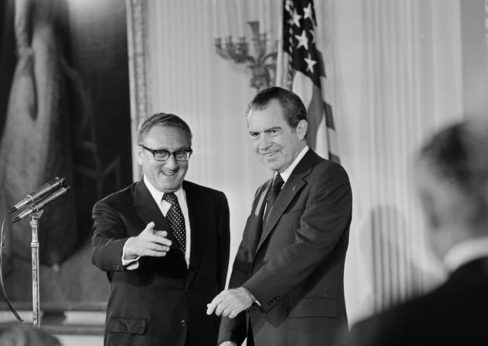
President Trump has recently “come out” as a “nationalist.” Some observers might see this declaration as a last-minute, desperate appeal to his xenophobic base to turn out in the November 6 midterm election, but the fact is that he has only finally and openly sworn his fealty to the racist ethos he grew up with: His father had an arrest record for marching with the Ku Klux Klan in New York City and was famous for discriminating against Black applicants for tenancy in his apartments. It’s a family tradition. The word Trump didn’t speak, but which everyone heard—his supporters as well as his foes—was “white” nationalist. It’s obvious that’s what he intended to convey.
Just days after the president’s announcement at one of his populist rallies, a white supremacist ideologue named Robert Bowers entered the Tree of Life synagogue in Pittsburgh with an automatic weapon and fired upon worshipers there, killing 11 and wounding several more. He claimed that Jews were responsible for the “invasion” of migrants from Central America—one of the themes Trump has been harping on since he began campaigning for the presidency—and in fact that the president had not gone far enough in identifying the true source of the problem. “I’m going in,” Bowers wrote to his internet friends moments before his attack.
Bowers could not have been unconscious of his timing, just two weeks before the 80th anniversary of Kristallnacht, when the Nazi regime declared open war on the German Jewish community by setting torches to synagogues and breaking windows of Jewish-owned businesses across the country. By his action, Bowers was unequivocally reminding Jews in America that they were not always considered acceptably “white.”
In alt-right speak, “nationalist” stands in opposition to “globalist,” another word for “cosmopolitan,” which was the more commonly used term in past years. Each of these is code for Jewish. The insinuation is that Jews, owing to their family and business ties reaching across continents, are uniquely positioned to subvert the legitimate, wholesome national aspirations of decent, innocent, pious Christians. Thus, to Bowers, HIAS (formerly known as the Hebrew Immigrant Aid Society) was responsible, with its pro-immigrant history and adherents, for dragging America into the gutter with unassimilable, brown-skinned newcomers.
It’s easy to trace modern anti-Semitism to a late Czarist-era forgery called “The Protocols of the Elders of Zion,” a purported scheme for the Jews to take power all over the world. That “fake news” of more than a century ago was often cited—and still is in certain circles—as a goad for discrimination, exclusion, pogroms, and death camps.
Anti-Semitism of course goes back much farther than that. Already in the 18th century, just to mention the name “Rothschild” was to summon up visions of Jewish masterminds whispering in the king’s ear and perverting royal destiny. And we must go back much further, too, to the Protestant Reformation, the Inquisition, the Crusades, and to the early Church teaching that Jews were the despised “Christ-killers.” Theologically, that doctrine did not get erased from Catholic doctrine until the 1960s, though not everyone has deleted the sentiment.
To be honest, even socialist systems were not immune from anti-Semitism, particularly during the Stalin years, when “internationalist” Jews were accused of colluding with Western Zionists. In some places, the virus cropped up long after Stalin was dead. The German socialist leader August Bebel referred to anti-Semitism as “the socialism of fools,” a false ideology designed to rally public opinion against a perceived common enemy—in some places and times, the “enemy of the people”—while diverting attention from the true despoilers of the earth.
If Jews did not believe in the divinity of Jesus Christ, then how could they be loyal to crown or state? Their participation in public life, whether as subjects or citizens, was always suspect. Jews were classically accused of “dual loyalty,” one visible part to the current regime, and another invisible part to the sinister global Jewish entity. In modern times, the rise of the State of Israel has often exacerbated this tension in the public mind.
How about class?
What’s missing from this story so far is a look at the factor of class and privilege. For most of history, since the emergence of an identifiable Hebrew or “Jewish” people, most Jews have been workers either on the land as herders and farmers or in small artisanal professions. In the European diaspora, Jews were not allowed to live in big cities, and were also forbidden to own land. Thus, many turned to professions such as tax collector or money lenders. Although they were agents of the local landowners, because they handled money they were thought to be rich and powerful—exactly what the landowners wanted the peasants to believe of them.
Even in Biblical accounts we learn of Jews who became wealthy and influential, although injunctions concerning labor rights and just treatment of others (including animals) constitute lengthy portions of sacred text rarely cited by today’s Biblical literalists. The story of Joseph, who became a trusted counselor to the Egyptian Pharaoh, is emblematic of the potential for a Jew to rise to a seat, if not of power, then at least next to the seat of power. But we also see how with the change of rulers, such trust can easily be lost.
The “Court Jew,” beginning with Joseph, is a familiar trope in Jewish history. Some indeed became highly influential, such as the Rothschilds, whose banking branches in many countries enabled the extended family to become wealthy financing rulers on both sides of international wars.

But throughout the millennia, Jewish tradition warns against the Court Jew temptation: The holiday of Purim, based on the Book of Esther (this year on March 20, 2019), reminds Jews to be faithful to their values and ideals and not to be swayed by the lure of power—even to be queen of the realm seated next to the mighty Persian King Ahasuerus (presumed to be the historical Xerxes).
Who, until now, exemplified the Court Jew better than German refugee and Harvard professor Henry Kissinger? Practitioner of Realpolitik, he became Secretary of State under Richard Nixon and then Gerald Ford. He was the principal architect of the destabilization campaign that brought down Salvador Allende’s socialist government and brought in Gen. Pinochet, he gave the “green light” to the Argentine military’s dirty war (which among its features rounded up many Jewish intellectuals and professionals for imprisonment or liquidation), and rubber-stamped the Indonesian invasion of East Timor. Preposterously, he shared the Nobel Peace Prize for helping to end the Vietnam War—which the Vietnamese had won themselves. Master of the quotable quip, he is famous for saying, “Power is the great aphrodisiac.” Did he know at the time—as later revealed by the Nixon White House tapes—how much anti-Semitism infected his boss’s presidency, and how much he was personally ridiculed? In her campaign for the presidency, Hillary Clinton raised eyebrows by citing Kissinger as a good friend and mentor, signaling, to the distress of many of her supporters, just what kind of foreign policy she might pursue.
Today’s all-powerful Jews include the often demonized Hungarian refugee George Soros, whom the ultra-right accuses of bankrolling the Honduran asylum seekers in order to destroy America. And in Trumpworld, especially during his campaign, they included the “globalist” Wall Street bankers who backed Hillary Clinton. Trump reposted one notorious image of Clinton from a neo-Nazi internet site that depicted her against a background of stacks of money, a big red six-pointed (Jewish) star and the label of corruption. That’s the magic of anti-Semitism: The Jews are responsible for all the sins of the world, whether they’re on the liberal-to-Communist end of the spectrum or the international finance capital side.
The Trump administration is studded with several prominent Court Jews. Some, like the president himself, may once have identified themselves as Democrats, but saw in the Trump phenomenon, and in the larger neoliberal austerity project, an opportunity for rapid enrichment and access to power by aligning themselves with him.
Of course, there’s his son-in-law, Jared Kushner, married to daughter Ivanka. Kushner is, like Trump, a player in the higher echelons of the New York real estate market—and equally indebted. Trump’s own grandchildren, by Jared and Ivanka, are Jewish. Kushner has successfully parlayed his relationship to the president of the United States into multi-million-dollar loans, from the Saudis among others. The saying “the personal is political” has never assumed such consequential proportions as now in public policy.
There are several other prominent Jews in the administration. In his business Trump relied on Jewish lawyers, such as Michael Cohen, who were intimately connected to the mogul’s private affairs. Early on in his career, Trump had Roy Cohn of McCarthy fame as a mentor. Another such lawyer would be Trump’s bankruptcy lawyer, David M. Friedman, whom Trump appointed as ambassador to Israel in 2017. Trump, with Kushner and Friedman, both of whom have generously funded right-wing nationalist Jewish settlements in the occupied West Bank, has reset the terms of the U.S.-Israel relationship to align with Prime Minister Benjamin Netanyahu’s vision of a Greater Israel that tosses aside both its own historic acceptance of a two-state solution for the Palestinian issue, and the official U.S. position on that as well.
Right now, the Evangelical right-wing in the U.S., and even the neo-Nazi fascists, are enamored with the powerful Israeli state that in its raw exercise of authority over the Palestinians has shown what a “white” settler regime can and should be doing to its darker, indigenous population. It has replicated many of the apartheid-like principles that were long known in America, under different circumstances and in different times, as Jim Crow. The right-wing applauds Jewish “nationalism,” seeing how Netanyahu flirts openly with Nazi-like leaders in places such as Ukraine and Hungary, and authoritarians such as Russia’s Putin and the U.S. Republican Party leadership.
But public opinion shifts over time. The day may come—and there are those who openly speculate about it even now—when it will become legitimate again to question the “dual loyalty” of such Jews in America: Are they more on our side or Israel’s?
At least the Evangelicals have a good excuse, though a fundamentally demented one: They support Israel wholeheartedly in their belief that the Messiah will come again when all the Jews have re-gathered in their historic homeland of Zion and the Rapture will signal the End of Days. Those Jews who have accepted Jesus as the Christ will be saved and enter Heaven; as for the rest, too bad. The Israeli leadership, including the country’s head rabbis, have warmly welcomed Evangelical support, obviously not buying into such Millenarian fantasies, but appreciating the church-sponsored tourism, the political allegiance on the world stage, and the emotional goodwill.
Another prominent figure who has heavily invested in Republican politicians is the Las Vegas gambling and hotel magnate Sheldon Adelson, also known for his extreme pro-Netanyahu views. He benefited hugely from the Republicans’ “tax reform.” Trump’s Secretary of the Treasury, Steven Mnuchin, former investment banker, film producer, and hedge-fund manager, is Jewish. He was photographed awhile back beaming with a sheet of freshly minted dollar bills hot off the press, proudly displaying his signature. It was almost a parody of the ancient “Jews and money” association.

And who can forget about Trump’s whiz kid (b. 1985) senior advisor for policy, the brilliant Stephen Miller? He was the communications director for Senator (now Attorney General) Jefferson Beauregard Sessions, and press secretary for the unhinged Evangelical Republican Rep. Michele Bachmann. Miller helped Trump with his inaugural address, and crafted the Muslim travel ban, the administration’s refugee policy, and the horror of separating children from their parents at the border. He has challenged the courts’ authority to limit the president’s rule on immigration policy.
The Court Jews have not spoken out against any of the president’s atrocities, nor his open acceptance of support from David Duke and other Nazis, whether of the alt-right, neo-, nationalist, or other varieties. They did not object to Trump’s pathetic waffling over the Charlottesville riot, where right-wing marchers chanted, “Jews will not replace us” (where? On dollar bills, as advisors in the White House, as media leaders and captains of industry?)
A breach in social cohesion
In the rush to deepen the hate against traditionally “despised” groups, such as African Americans, immigrants, LGBTQ people, women, foreigners who are either from “shithole” countries or stealing our jobs, the Trump presidency has created new and possibly irreparable breaches in social cohesion. Hate crimes have risen precipitously, often egged on by the president’s own provocatively repulsive speech. The Anti-Defamation League cites a 57 percent increase in anti-Semitic vandalism, threats, and harassment over the last year.
Jewish journalists, a favorite target of the president, have been attacked verbally and physically, often irrespective of their politics. The conservative columnist Jonah Goldberg, who once regularly justified Trump’s policies, revealed in a recent article that “when the alt-right first rallied around Trump, starting in 2015, I was one of their targets. I was besieged with anti-Semitic filth. I ranked sixth on the Anti-Defamation League’s list of targeted Jewish journalists. Once, when I mentioned that my brother had died, I was pelted with ‘jokes’ asking if he’d been turned into soap or a lampshade.”
On the president’s unwanted, unwelcome visit to Pittsburgh in the wake of the Tree of Life murders, he sounded off again on the impending “invasion” of the Central American hordes—the very issue for which the 11 victims were shot to death. Trump was not merely “insensitive” or “tone deaf.” He was openly condemning the gunshot victims for their own death, in almost the same language the killer Bowers had used.
In recent days, Trump has rhetorically proposed that by executive order he will cancel the American birthright of some people born in this country (as he tried to do for years to attack Hawaii-born Barack Obama). The birthright issue also has echoes in Nazi Germany: In the mid-1930s, German Jews were legally declared not German citizens like their Aryan fellow nationals.
Most Jews oppose Trump, which he certainly knows and which has made Jews—with the notable exception of his supporters among them—a particular object of his disdain.
The country has seen, far more quickly and radically than it ever imagined, how corrosive speech leads to criminal actions. We have witnessed the results.
In the early days, there were Jews who supported Hitler. Either they believed he could restore order to a chaotic economy and create employment. Or they were able to dismiss his anti-Semitic rantings as lunacy, while focusing on his encouragement for big business. Or they thought they were too important for him to touch. Or they figured they could bargain for release of Jews to go to Palestine and help build the Zionist home there.
All who continue to seek the king’s favor should remember Pastor Martin Niemoeller’s prophetic warning, “First they came for the socialists, and I did not speak out because I was not a socialist…then they came for trade unionists…then they came for the Jews…then they came for me—and there was no one left to speak for me.”
The Court Jews will not be saved. No one will be saved.
There will be plenty more to do after November 6. Right now the focus is on the critical midterm election. Be sure you and your family and friends vote. It’s the first step toward ending the insanity.












Comments